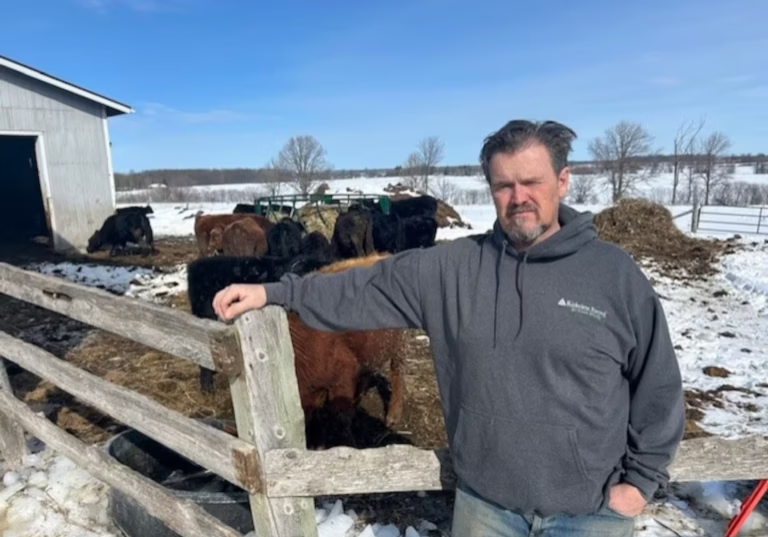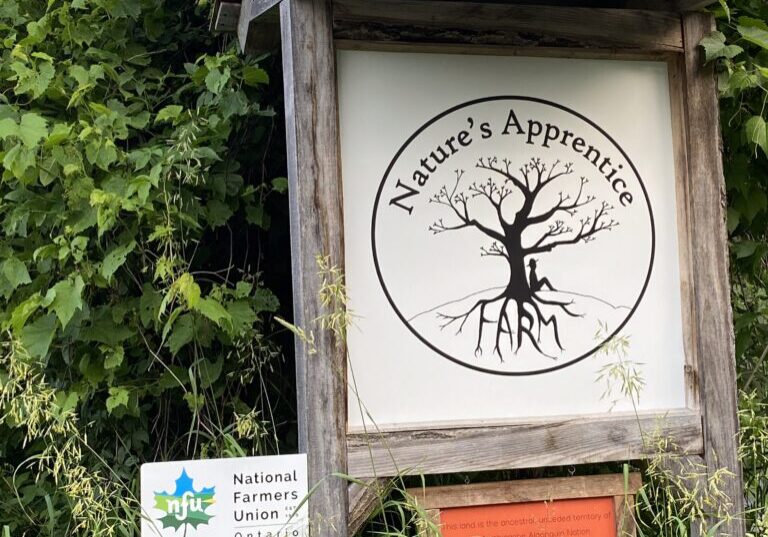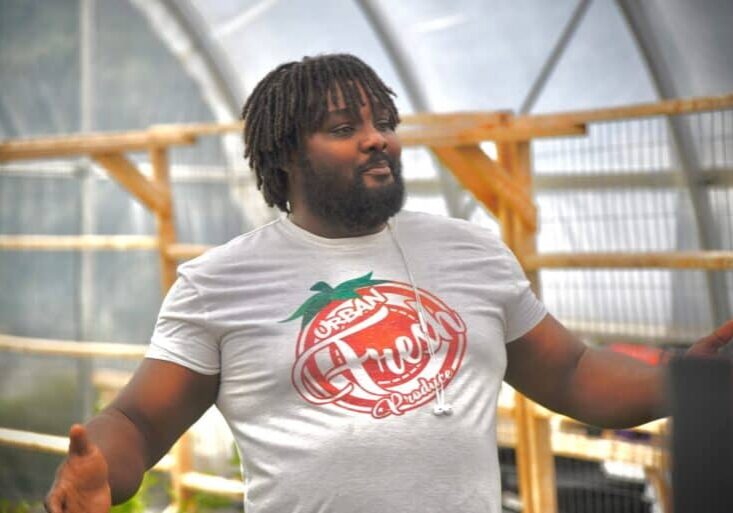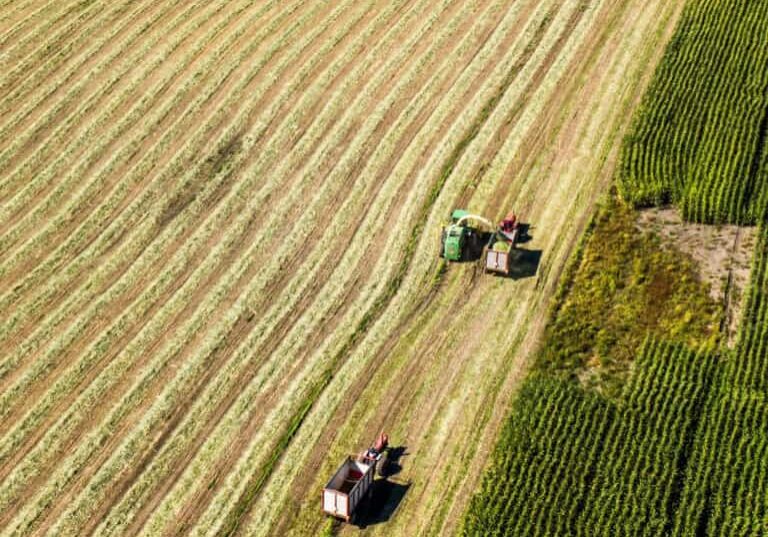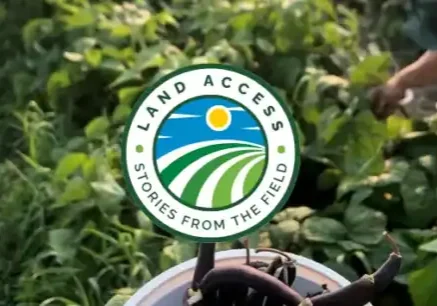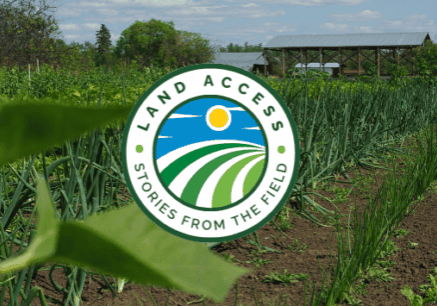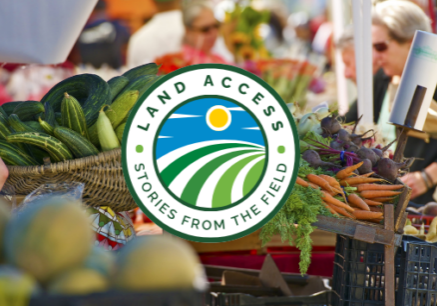The metamorphosis of Lucky Bug Farm
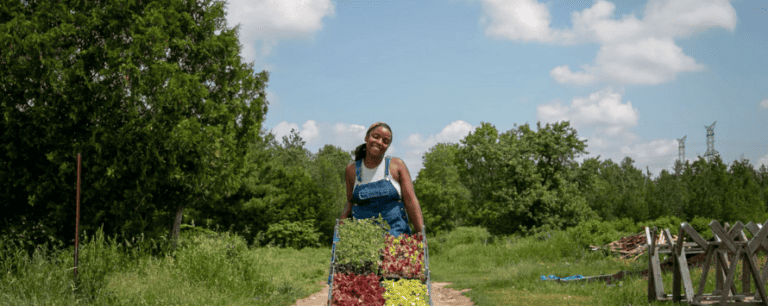
National Farmers Union – Ontario Newsletter
The Rural Voice | September 2023
When the COVID-19 pandemic began, Aliyah Fraser was an urban planner. Months later, she found herself with hands in the ground, owner and operator of Lucky Bug Farm.
Despite her lifelong passion for food, Aliyah had never considered farming prior to 2020. “Because of who I saw as a farmer and the image I had of farming, I never thought that it could be something for me,” she says. “So many people had that view of farming: that it has to be large scale, you have to have a tractor, you have to own land. You kind of have to be a white person. And so, I just never saw myself in that career.”
The pandemic soon sparked a shift in perspective. Like many, she started growing food for herself during that time, which led to a desire to have a direct impact on the food system. She wanted to increase awareness of “all of the different ways that farming can happen, […] and who can be doing it, and on various different scales,” she says. It was also around this time that Aliyah discovered Cheyenne Sundance of Sundance Harvest, a young Black farmer who began her operation on rented land. Farming, Aliyah realized, was something she could do.
With no prior agriculture or business experience, Aliyah dove headfirst into farming. In 2021 she founded Lucky Bug Farm, named for her family nickname of “ladybug” and her hopeful outlook. Lucky Bug Farm is a small market garden where she cultivates vegetables on rented land in Baden, Ontario. This season, she’s experimenting with adding vegetable jams to her repertoire. Aliyah mainly distributes Lucky Bug Farm produce through a CSA, relishing the opportunity to bridge the gap between farmer and eater.
While Aliyah left her urban planning profession behind, her background continues to shape her worldview and activism. Especially striking is her vision for the future of farming, one characterized by community and diversity.
“Housing policies in rural areas need to change to accommodate farming in community together,” she says. By providing adequate on-farm housing, alternative farming models such as co-ops and community-based initiatives can flourish. On-site housing also increases accessibility for new and young farmers who may struggle to secure land otherwise. Aliyah clarifies that allowing secondary housing does not equate to transforming farmland into suburban areas; instead, it allows farm workers and farmers to have living conditions that enable their farming careers.
Aliyah also believes that urban agriculture can be a powerful tool in exposing people to the various forms that agriculture can assume. About representation of farm types, she says “It’s vital to support small-scale farmers and show how vital small- scale farmers are to a climate resilient, just future.” Urban agriculture showcases that farming can be small-scale, carried out on
rented land, and pursued by young individuals without familial ties to farming.
Aliyah’s commitment to change is evident in her active involvement with the NFU. She sits on the Local 340 Board and actively participates in both the BIPOC and Youth Caucus. Through her work in membership development for the NFU-O, she has fostered connections with numerous farmers across Ontario. Aliyah also co-hosts the podcast “Sow and Grow,” which delves into the factors shaping Canadian agriculture.
Outside of Lucky Bug Farm, Aliyah works off-farm at the White Owl Native Ancestry Association. Her responsibilities primarily revolve around community-based growth at Schneider Haus, a national historic site in Kitchener. During her free time, she enjoys cooking, playing video games (current favorites include Animal Crossing and Legend of Zelda), and watching Studio Ghibli films alongside her partner and cat.
Aliyah may not have followed a conventional trajectory to farming, but Lucky Bug Farm stands as a testament to her courage and willingness to carve out her own unique path to agriculture. ◊
(Photo source: https://luckybugfarm.com/)
Click here to view the PDF version.
A subscription to The Rural Voice is one of the benefits of being an NFU-O member
